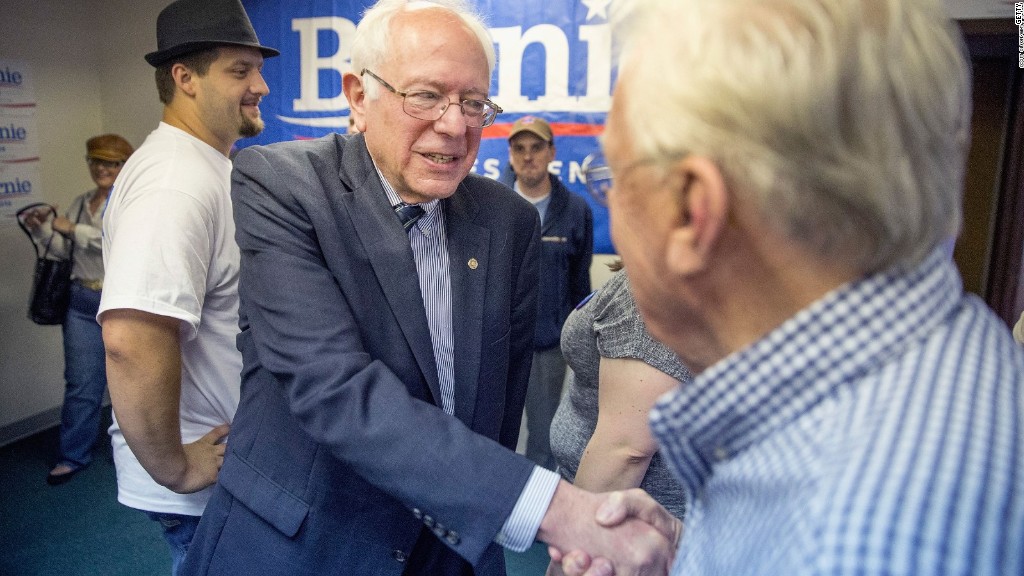
Bernie Sanders likely wants to raise everyone's taxes to pay for universal health care, but promises it will be worth it.
The Democratic presidential contender has long promoted a single payer health care system, which would eliminate the private insurance market in favor of a government-run program. He calls it 'Medicare for All.'
Sanders' plan for health insurance is now in the spotlight, with rival Hillary Clinton demanding that he reveal how he'd pay for it. Her campaign contends it would require raising taxes on the middle class by 9%.
Sanders has waffled on whether he'd unveil details before the Iowa caucuses next month, but said the plan would be similar to legislation he introduced in Congress in 2013. Under that proposal, the middle class would ultimately save money, he says.
Here's what we know about Sanders' single payer plan from his 2013 bill.
What it would look like
Say goodbye to work-based insurance, Obamacare, Medicare (for senior citizens only) and Medicaid.
Instead of buying policies from private companies, Americans would obtain coverage from a state-run health care system. A national standards board would establish basic benefits and funding guidelines, but states would have the flexibility to design their own programs.
Coverage would be generous. Not only would it include hospital stays and doctors' visits, but the insurance would pay for home health and adult day care, prescription drugs, dental visits, mental health services and outpatient therapy.
No one could be turned away for pre-existing conditions. Also, doctors couldn't charge patients more than the rates set by the state system.
How he'd pay for it
Americans would no longer have to pay premiums for health insurance coverage. Neither would their employers.
That would save workers paying for family coverage nearly $5,000 in premiums a year, on average, while their employers would be spared nearly $12,600, according to the latest Kasier/HRET Survey of Employer-Sponsored Health Benefits.
Deductibles, co-pays and other out-of-pocket expenses would also be eliminated, according to a press release issued by the Sanders campaign in November. These expenses have been a growing source of financial strain for Americans as employers and insurers shift more of the cost to policyholders. The average deductible, for example, is now $2,012 for a family, according to the Kaiser/HRET study.
Instead, Sanders' 2013 proposal calls for two new taxes: a payroll tax on employers of 6.7% and a progressive income tax.
Unlike Social Security levies, the health care payroll tax would be paid on all wages or self-employment income.
Related: How Hillary Clinton wants to make the rich pay their 'fair share'
The income tax would start at 2.2% for married taxpayers with incomes of less than $250,000. The rate would then step up several times and top out for those with incomes above $600,000, who would pay $18,700, plus 5.2% of earnings above that threshold. (Single taxpayers have a separate tax schedule.)
Sanders' plan also calls for a 5.4% surcharge on married couples' income above $1 million.
While Clinton's campaign says his proposal would saddle the middle class with additional taxes, Sanders counters that they'd save money.
A family earning $50,000 would pay $1,100 in income tax and their employer would pay $3,350 in payroll taxes on their behalf. But they could save more than $7,000 in premiums and deductibles and their employer wouldn't have to fork over $12,600 for its share of the premium.
Would this be enough to cover health care costs
Under this scenario, high income workers would likely pay more than they do now because the higher payroll and income taxes would probably exceed their current health care premiums, said Larry Levitt, senior vice president at the Kaiser Family Foundation. Lower income workers would come out ahead because their taxes would likely be less than their current premiums.
The answer is murkier for the middle class, Levitt said. It depends on whether one has a single or family plan, as well as how many children are covered. Those with bigger families, who generally have higher premiums and deductibles, will likely benefit from Sanders' proposal.
More problematic, however, is whether the payroll and income taxes will cover the cost of insuring all Americans. Some experts say it falls far short.
Related: Clinton vs. Sanders: The battle for the middle class
Americans currently spend $3 trillion on healthcare annually. About $991 billion is spent by private insurers. The rest includes government expenditures on Medicare, Medicaid and consumers' out-of-pocket spending.
Sanders, like many advocates of single payer systems, argues that total health care spending will go down under his plan. Administrative costs should be lower because it will eliminate the multitude of private insurers currently involved. Also, the federal government should be able to wring better rates from providers and larger discounts from drug companies by leveraging its size.
Related: Free college and healthcare for all -- how would Bernie Sanders pay for it
Sanders' plan hasn't been evaluated by the Congressional Budget Office or major think tanks. But a rough estimate by RAND Senior Policy Researcher Peter Hussey -- using CBO's estimate of total wages and Sanders' tax rates -- found the proposal would probably bring in around $700 billion.
Separately, RAND researchers Chapin White and Virginia Kotzias estimated a single payer program would take a nearly 12% payroll tax to cover costs. Eliminating deductibles and co-pays would make it harder to make the numbers work, especially since it would likely prompt people to go to the doctor more often or get more tests done.
"It would be a very optimistic assumption that you could pay for it with just income and payroll taxes at the level [Sanders] proposed," Hussey said.


